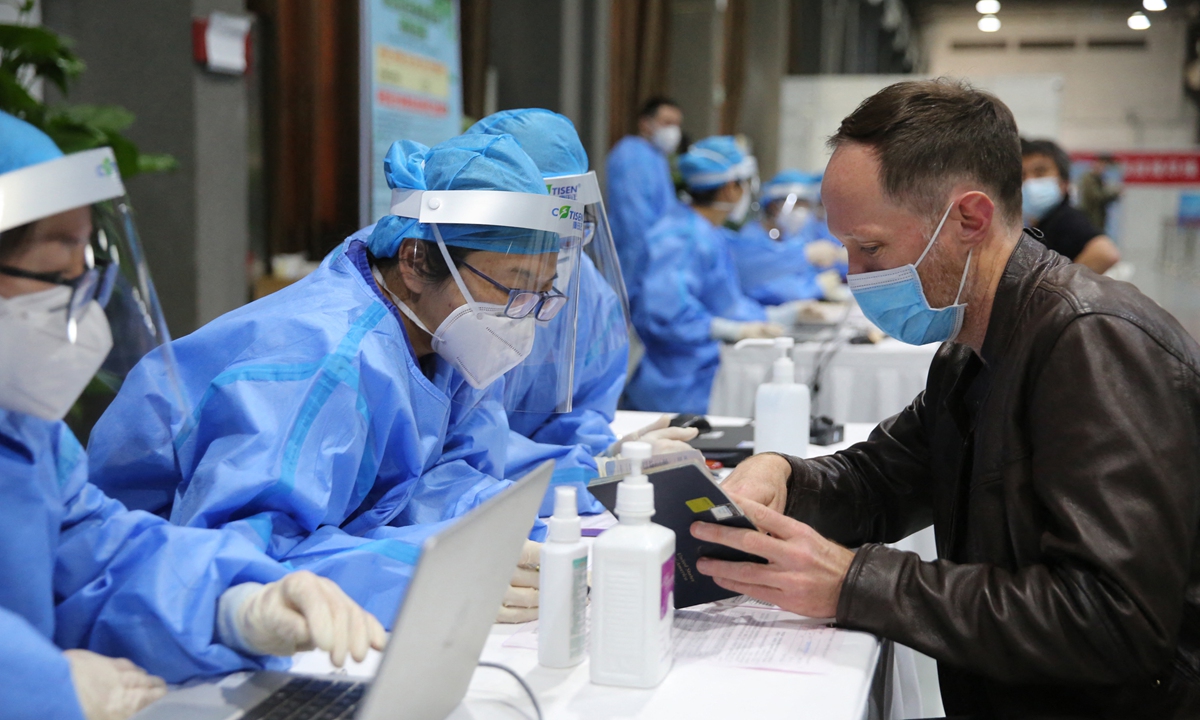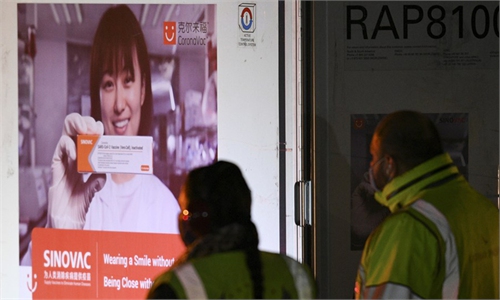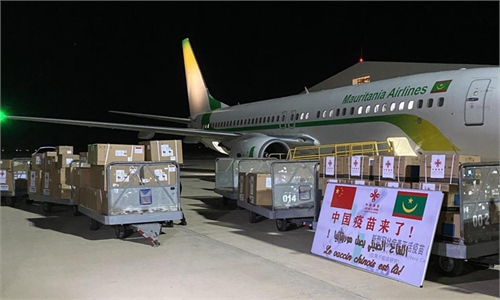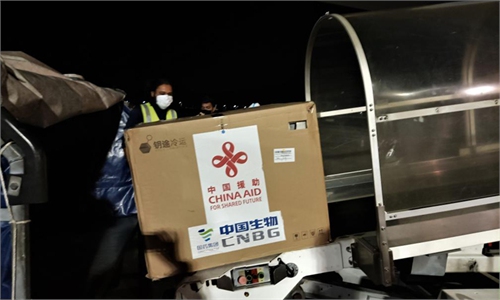Supply chain tests vaccine speed for China and the US, as US short of everything from needles to bottles
China needs bottles, but US cries for everything

Foreign reporters sign up for Sinopharm's vaccines in Beijing on Tuesday. The Chinese Foreign Ministry confirmed on Wednesday that around 150 reporters from 27 countries' 71 news organizations had received Chinese vaccines on Tuesday in the Chinese capital. Photo: AFP
With the massive rollout of coronavirus vaccine, China and the US are in a race to scale up production to secure enough doses as quickly as possible. While supplies of key vaccine components, chemical ingredients and raw materials do not seem to pose a challenge for China, the US could run into hurdles in accessing the complex mRNA raw materials such as antiviral agents, industry observers noted.
But the world's two largest economies are now facing a critical issue in securing enough related items for production, with China in urgent need of vaccine bottles, and the US crying for almost everything from vaccine bottles to syringes and needles. And companies in each country are ramping up production to fill up the gap.
China's vaccines mainly include COVID-inactivated virus, sodium chloride, and aluminum hydroxide, which are sure to meet the current demand because they are both very simple chemicals, Tao Lina, a vaccine expert, told the Global Times on Friday.
Echoing Tao's view, Chinese industry insiders also confirmed with the Global Times that the supply of those materials has been enough, with some companies also expanding production to meet future demand.
A Shanghai-based vero cell producer, who spoke on condition of anonymity, told the Global Times on Friday that the firm has not planned a further expansion on production, indicating that the firm's capacity meets market demand.
The producer received orders from labs and vaccine manufacturers. Nearly all COVID-19 vaccines in China are produced using the vero cell culture method.
A manager surnamed Liu at a medical sodium chloride producer based in Nantong, East China's Jiangsu Province, also told the Global Times on Friday that the domestic orders have shot up, but the company is able to handle the demand.
The firm has so far expanded its annual production to 10,000 tons a year. And the home market accounts for over 90 percent of its business.
China's daily production of the vaccine had risen from 1.5 million doses on February 1 to about 5 million doses, with more than 100 million doses supplied to the domestic market, according to Xiao Yaqing, Minister of Industry and Information Technology.
US vaccine producers Pfizer, Moderna and Johnson & Johnson executives say they are working all the angles on increasing COVID-19 vaccine production and expect to ramp up weekly deliveries by tens of millions by the end of March, Fiercepharma reported in February.
But according to Bloomberg, ramping up production has been a headache for the Biden administration, who pledged to have 200 million doses of vaccine delivered by April 30 during his first 100 days in office.
The mRNA vaccine is completely synthetic and does not require the help of other biological agents. But developing synthetic mRNA, which involves producing, harvesting and encapsulation, is time-consuming and complicated, according to medical experts.
But even if the developers churn out millions of mRNA, another issue is that the US is also short of vaccine medical products, industry insiders said.
In February, the US invoked the Defense Production Act to curb the export of raw materials in an attempt to ensure that US drug makers have priority access to raw materials and critical equipment needed to produce the vaccine.
Several Chinese companies in the needle and syringe business told the Global Times that they have seen rising orders from the US before Biden's statement and have been running at full capacity.
Zhejiang KangKang Medical Devices Company's capacity was running at full capacity early this year when the global demand for vaccinations went up and their orders also piled up to July, with rising pressure from the sudden rise in orders from the US pushing for a quick delivery on short notice.
"We have seen order inquiries jump by 20-30 percent in recent weeks since the Spring Festival, almost all from the US, with some asking for a quick delivery within weeks," said Guo Chun, an executive of Zhejiang KangKang Medical Devices Co.
Yang Jianlong, a director of the China Association of Medical Equipment, told the Global Times on Friday that the orders are mostly for export, and the current production capacity of syringes, needles and other equipment is enough to cover domestic vaccination needs.
Zhao Jian, a manager of Puyang Glass Work Company in Puyang, Central China's Henan Province, noted that there is a huge gap in China between the supply and demand of borosilicate vaccine bottles.
He told the Global Times on Friday that the company plans to source more machines to expand borosilicate vaccine bottle production.
"Our current annual capacity is about 1 billion. We plan to expand it to 6 billion bottles for the next three years," Zhao said,




